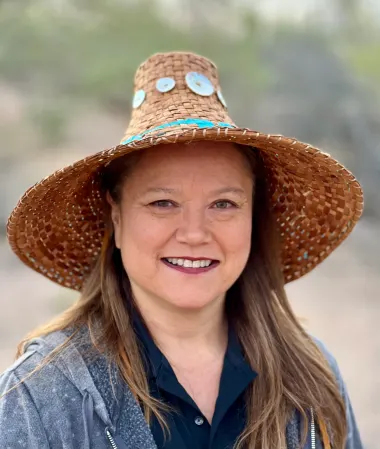
SOIN23 Announcement for Social Media – Photo downloaded via the NCAI SOIN Media Kit
National Congress of American Indians President Fawn Sharp delivers the annual speech, encouraging Indian Country to remain united on issues faced by Indigenous nations
Just two weeks after President Joe Biden delivered his State of the Union address to the country, NCAI President Fawn Sharp, Quinault Indian Nation, stood in front of a packed house to deliver the State of Indian Nations 2023, SOIN23, address.
The State of the Indian Nations address took place Feb. 21 at the National Museum of the American Indian in Washington, D.C., the first in-person SOIN address since COVID.

Every year, NCAI presents the address to members of Congress, government officials, tribal leaders, tribal citizens, and the American public, sharing the positive and future-oriented visions of tribal nations. Speakers covered topics including missing and murdered Indigenous peoples, the expansion of the Violence Against Women Act, rematriation, economic issues, the Indian Child Welfare Act, and more.
“No weapon formed against us can ever prosper, no bullet, no piece of legislation, no court decision.”
NCAI President Fawn Sharp
Lance Fisher, Nátsėhéstahe, Northern Cheyenne, led the invocation, sharing a song he’s also sang for several other gatherings of Congress, including the opening to the Senate hearing on Indian Boarding Schools.
Prior to Sharp’s speech, several Native leaders — Cynthia Chavez Lamar, NMAI director, Larry Wright, Jr., NCAI executive director, and Caleb Dash and Yanenowi Logan, NCAI Youth Commission co-presidents – took the stage. They inspired the audience to push work toward a better future for Indian Country.
In her opening remarks, Sharp talked about how the wisdom of the elders and the youth has shaped the past and will direct the future of Native nations.
“To our elders and our youth: I am inspired by your strength and your passion,” said Sharp. “You are the very best of Indian Country, and I continue to learn from the examples you’re setting in so many communities, from Maine to Arizona … from Florida all the way up to Alaska.”
Sharp continued: “We have incredible momentum, and now it is up to us as tribal leaders to just show up and demand more. More for our elders, more for our youth, and more for our future.”

She also spoke of policy accomplishments, reauthorization and expansion of the Violence Against Women Act, advanced appropriations for the Indian Health Service, and equality in critical funding for tribes on par with state and local governments.
The NCAI president also specifically called for the passage of the Honoring Promises Act, which would seek to fund tribal nations at levels promised through treaties. She said now is not the time to settle but to press forward on efforts to secure federal policies that are in favor of Indian Country.
“To our elders and our youth: I am inspired by your strength and your passion. You are the very best of Indian Country, and I continue to learn from the examples you’re setting in so many communities, from Maine to Arizona … from Florida all the way up to Alaska.”
NCAI President Fawn Sharp
Despite the Biden Administration’s efforts to meet the basic needs of tribal communities, federal funding still falls well below the mark of repaying the debts owed by the United States to the tribal nations.
This year, U.S. Sen. Elizabeth Warren, MA-D, provided the Congressional response to the State of Indian Nations address via video recording.
Sen. Warren spoke to the audience in attendance in-person and virtually. She has introduced or co-sponsored more than 100 pieces of legislation on behalf of Indian Country. Her work, she said, is only possible because of the work of tribal leaders.
“I could not have done it without the input, the guidance, the education, and the wisdom from NCAI and from tribal leaders and advocates from every corner of the United States.”
SOIN kicks off NCAI’s Executive Council Winter Session, which brings tribal leaders to the nation’s capitol to tackle obstacles facing tribes.
“No weapon formed against us can ever prosper, no bullet, no piece of legislation, no court decision,” said Sharp. “If we exercise the rights that are inherently ours, if we step fully into that power and embrace it, every single day, with every single breath of our being, from sunup to sundown and every minute in between, nothing can stop us.”
Watch a replay of SOIN23:
A transcript of SOIN23 is also available here.
© Buffalo's Fire. All rights reserved.
This article is not included in our Story Share & Care selection.The content may only be reproduced with permission from the Indigenous Media Freedom Alliance. Please see our content sharing guidelines.







